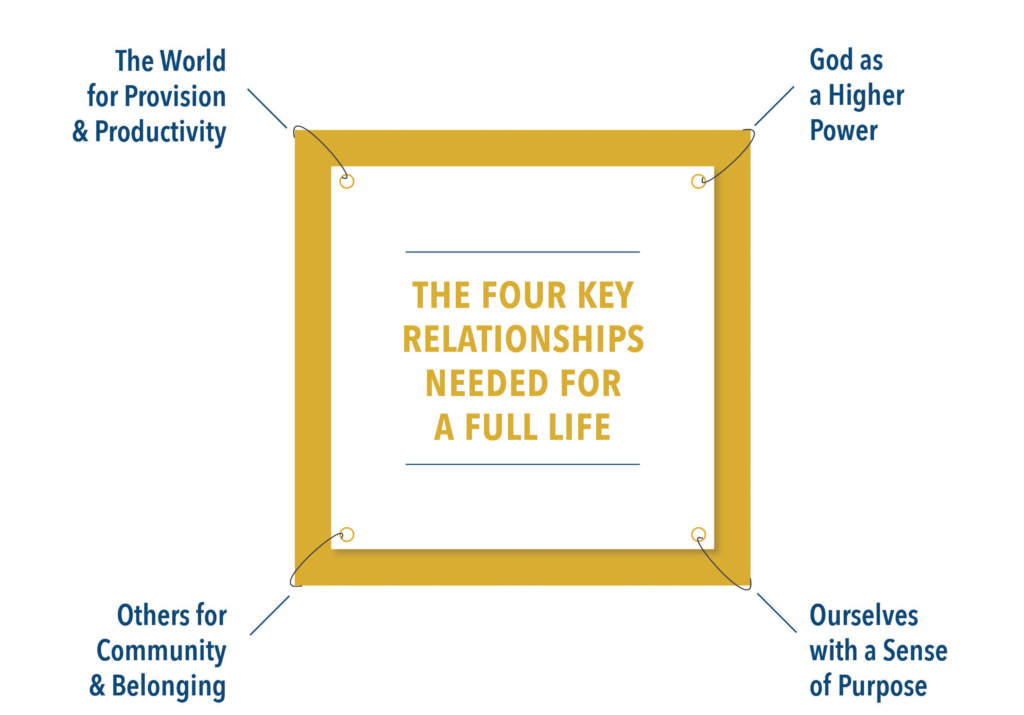Defining a Full Life
The Four Key Relationships Needed for a Full Life
A full life can be different for each of us and can change from season to season. At different times, our achievements at work, spending time with a spouse and family, connecting with friends, traveling, having opportunities to personally learn and grow, or having time to invest in our physical and spiritual wellness can fulfill.
One aspect that can’t be denied is that deep and meaningful relationships matter in terms of having a full life… as well as being happier and healthier. In fact, this was also a conclusion of a 75-year study conducted by Harvard University.
The study further concluded that the presence of someone we can rely on, trust, and be vulnerable with reduces our emotional as well as physical pain, and that the absence of these types of relationships can lead to earlier declines in our mental and physical health and earlier death. In addition, the people who were most satisfied in their relationships at midlife were the healthiest at age 80.
The types of relationships matter as well.
As described in my book, Reversing Burnout. How to Immediately Engage Top Talent and Grow! A Blueprint for Professionals and Business Owners, I learned about the power of relationships as I was studying poverty and researching the best ways to help eradicate it as part of our service work.
We grew to love the children and the people we were serving. We saw firsthand that we had so much in common. The only major differences were that the people we served had much less than most of us materially and had fewer opportunities.
At the same time, however, there were major differences coming in the other direction.
Those we served seemed to have a greater sense of community, connectedness, and contentment than many of us serving did. It was clear that they had “less” but also clear they had more overall happiness and joy. That was a paradox for me. It ran counter to my world view at the time and left me perplexed.
“Regardless of your definition of a full life, relationships matter.”
-Peter C. Atherton
Being perplexed drove me to better understand poverty.
To do so, I again took to available books and books-on-tape. My free time, car time, and walk-around the Eastern Promenade at lunch time were filled with learning. In our service work, we also continually tested and tried what we learned as we enhanced and expanded our offerings. Books like When Helping Hurts by Steve Corbett and Brian Fikkert and Toxic Charity by Robert D. Lupton were a couple of the books that articulated well how a lack of several key relationships all contributed to poverty, and that establishing and strengthening all these relationships is essential to helping to address poverty.
It was only partially about money and things. Those would only help address aspects of material poverty.
Of equal or even greater importance was a positive sense of self, connections with others, and faith in something greater than ourselves.

These references validated what we experienced and helped fill in the gaps.
The four key relationships essential to addressing poverty included:
1
A relationship with God as a higher power
2
A positive relationship with ourselves and a sense of purpose
3
A relationship with others and a sense of belonging within our communities
4
And a relationship with the world in a way that allows us to be productive and to be able to provide for ourselves and our families
Establishing and strengthening each of these relationships would be the key to addressing all forms of poverty – material, emotional, and spiritual.
These four relationships work in the inverse, too.
We experienced this over the years of leading service teams. While many of us were not materially poor, many of us did feel emotional and spiritual deficits.
Through our experience and the work of others, the lack of one or more of these key relationships is what leads to discontentment. Establishing and strengthening these four relationships in our lives also leads us to a life with greater joy and contentment.
“As high-achievers, our worlds can get complicated. Sometimes just simple truths can get us back on track.”
-Peter C. Atherton
For many of us high-achievers, given our committed focus on our crafts and our careers (i.e., our relationship with this world for provision and productivity), we may need to focus more on balancing our investments in the three other relationships in order to win at life in the way we are winning or have won in our careers.
We can begin to do this by simply taking inventory of our relationships:
Are we living 1, 2, 3, or 4-dimensional lives?
Are there one or two relationships that we have neglected and feel drawn to?
Awareness of what a full life entails is a large part of being able to achieve a full life. Another part is understanding the various traps that can prohibit or slow our ability to make the changes necessary to live a full life.
It is this full life that leads to having the balance and integration we all desire – both now and over the long-term.
To your winning,

PS – Ready to increase your engagement and your impact? Check out our Fast Start Programs.
PS – Are you or your team feeling overwhelmed, or are you burning out? There is a big difference and each requires a different approach. Take this FREE quiz to find out where you stand and learn exactly how you can get back on track by clicking HERE.
Check out too the AEC Leadership Today Podcast designed exclusively for leaders who want to stay relevant and effective and help their firms grow and prosper during all times >> HERE!

Pete Atherton
About the Author
Peter C. Atherton, P.E. is an AEC industry insider with over 30 years of experience, having spent more than 24 as a successful professional civil engineer, principal, major owner, and member of the board of directors for high-achieving firms. Pete is now the President and Founder of ActionsProve, LLC, author of “Reversing Burnout. How to Immediately Engage Top Talent and Grow! A Blueprint for Professionals and Business Owners”, and the creator of the I.M.P.A.C.T. process.
Pete is also the host of The AEC Leadership Today Podcast and leads The AEC Leadership Mastermind.
Pete works with AEC firms to grow and advance their success through modern and new era focused strategic planning, executive coaching, leadership and management team development, performance-based employee engagement, and corporate impact design. Connect with him through the contact link below.


